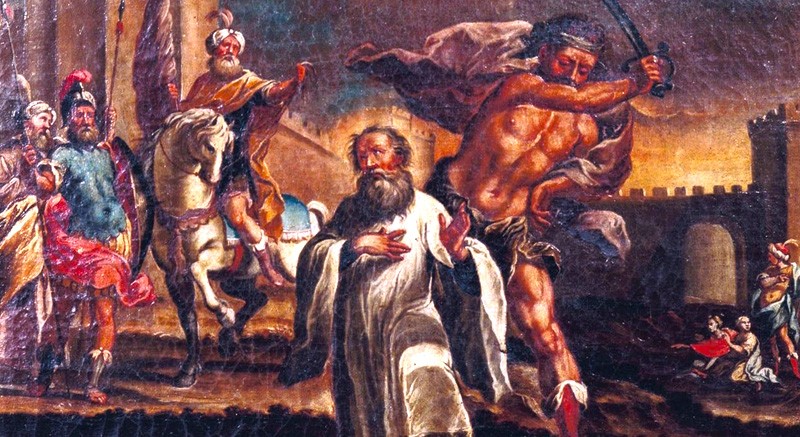(Died 859 AD)
In the 9th century, Spain was ruled by the Moors, and it was in their capital, the city of Cordova, where we encounter today’s saint.
The Muslim rulers had tolerated the Christian religion among the Goths, exacting only a certain tribute every new moon. Things would change, however.
Eulogius was educated among the clergy of the church of St. Zoilus, a martyr, who suffered at Cordova, with 19 others, under Diocletian, and is honored on the 27th of June. Here Eulogius distinguished himself by his virtue and learning; and being made priest and became the head of the chief ecclesiastical school in Spain, which then flourished at Cordova.
By his pious example of fasting and prayer, his humility, mildness and charity, he gained the affection and respect of everyone. He often visited the monasteries for his further instruction, and prescribed rules of piety for the use of those who desired to serve God.
Some of the Christians, however, were indiscreet and openly preached against Mohamad, and tried to expose the religion established by him. This activity brought about a bloody persecution at Cordova, in the 29th year of Abderrama III. In 850 AD, Reccafred, an apostate bishop, declared against the martyrs, and at his instigation, the bishop of Cordova and some others were imprisoned, and many priests, among whom was St. Eulogius, as one who encouraged the martyrs by his instructions.
It was then that Eulogius wrote his “Exhortation to Martyrdom,” addressed to the virgins Flora and Mary, who were beheaded Nov. 24, 851. These virgins promised to pray as soon as they should be with God that their fellow-prisoners might be restored to their freedom. In 852, several more suffered a similar martyrdom.
A council at Cordova, in 852, forbade any one to offer himself to martyrdom. Mahomet succeeded Abderrama III upon his sudden death by an apoplectic fit but continued the persecution and put more Christians to death.
St. Eulogius encouraged the condemned as they approached their martyrdom. In fact, he wrote a history of the martyrs, called the “Memorial of the Saints,” in three books: and an Apology for them against calumniators, showing them to be true martyrs, though without miracles. St. Eulogius was released but was obliged by the persecutors to live always with the treacherous bishop Reccafred, watching over him. He therefore refrained from saying mass, so that he was not obligated to communicate with that domestic enemy.
When the archbishop of Toledo died in 858, Eulogius was canonically elected to succeed him. Another brush with the Muslim overlords made his reign to only two months.
A young Moorish girl, Leocritia, had been privately tutored in Christianity by a relative and was clandestinely baptized. When her father and mother found out they beat her continually to make her renounce her new faith. The situation came to the attention of Eulogius and his sister Anulona. They arranged an escape for the girl, and she was harbored among some of the Christian community.
When the Muslim authorities found out about the arrangement, they arrested all of those involved, including Eulogius. He was threatened with being scourged to death, but Eulogius answered that his torment would be to no avail as he would never renounce his faith. In the end the good saint was decapitated outside of the city gates.
Adapted by. A.J. Valentini from: Butler, A. (1866). St. Eulogius of Cordova, Priest and Martyr. March 11. Rev. Alban Butler. 1866. Volume III: March. The Lives of the Saints. Bartleby.Com. https://www.bartleby.com/210/3/111.html
